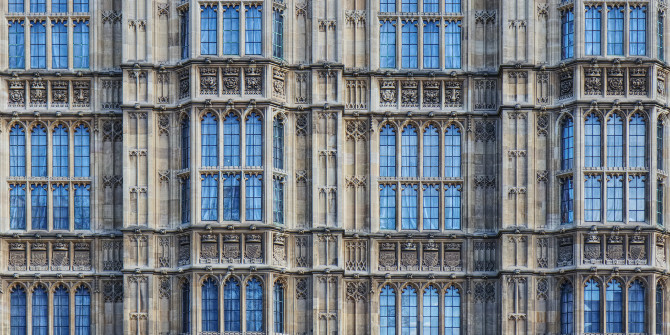 While the Supreme Court has signalled its determination to defend established constitutional principles in the prorogation case, a problem underlying recent crises is the idea of national sovereignty, argues Marinos Diamantides. This idea is at odds with the reality of governing nation-states.
While the Supreme Court has signalled its determination to defend established constitutional principles in the prorogation case, a problem underlying recent crises is the idea of national sovereignty, argues Marinos Diamantides. This idea is at odds with the reality of governing nation-states.
Secular liberal constitutionalism rests on postulates replete with inevitable contradictions and paradoxes. Thus, in the UK the rule of law is to be respected alongside absolute parliamentary sovereignty. ‘Absolute’ constituent power is vested in the electorate not in referenda but in parliamentary elections, the timing of which is now set by law; and it is still possible for the Executive to act on the basis of archaic prerogative powers, rather than Parliamentary authorisation.
The judiciary has painstakingly, if not consistently, spent the last centuries building a body of public law that maintains the order built around these postulates but also rationalises them away from their mystical origins. The recent Supreme Court judgment on prorogation was no different. This ‘historic’ decision is not subversive or revolutionary but the latest step in a long process of judicial review. The courts of this country have firmly established that it is they who decide whether a prerogative power exists and if so its extent, including by requiring that some reasonable justification is offered. Of course, it was a novelty to have them exercise their supervisory jurisdiction in relation to the limits of the power of the Prime Minister to advise the Queen to prorogue Parliament, as well as to set the reasonable justification standard as they did.
Yet all things considered, there is nothing subversive in hearing the judges declare that the lawfulness of the PM’s advice is justiciable, like more and more other uses of the prerogative, and that ‘reasonable justification’ must be offered by the government whenever a prorogation occurs. After all, the key constitutional principle in this country for centuries has been that of parliamentary sovereignty and no-one can seriously contest that this principle would not be undermined if the executive could prevent Parliament, for as long as it pleased, from exercising its power to make laws and from holding the government accountable. Nor, is the ruling audacious in the sense that it embarrasses the PM as a liar and the monarchy as gullible. First, there was no need for that. The falsehood of the PM’s claim that parliament’s suspension was a conventional legislative reboot ahead of a Queen’s speech was simply too obvious. One could argue that it was never even meant to be believed only not to be questioned, something which the Queen had no right to do.
Secondly, our judges did not say that the government lied but that they did not provide any reasonable justification as deemed necessary in the circumstances. So, there is nothing subversive in the decision upholding parliamentary sovereignty and the rule of law as interpreted in courts against another use of archaic prerogative.
Why the gasps then? Yesterday’s ruling constitutes a twist in the debate over the role of the law in ‘exceptional circumstances’. Normally, the Executive wishes to shield its use of prerogative power from legal scrutiny by announcing that a ‘state of exception’ exists. And, normally, the British Judiciary does not question that. This time round, however, the strategy of the Executive was to present the prorogation, tongue-very-much-in-cheek, as ‘business as usual’. The Court’s unanimous decision, however, emphasised that the prorogation was not ‘normal’ and ‘took place in quite exceptional circumstances: the fundamental change which was due to take place in the Constitution of the United Kingdom on 31st October’. The government’s suggestion that a prorogation of five weeks at this juncture was ordinary housekeeping, no-questions-asked, was questioned and refuted.
Liberal constitutional lawyers will justifiably rejoice with this twist. After decades of setbacks for liberal constitutional democracy, in times of government-declared emergencies, this ruling is a victory for the old idea that legitimacy requires both majoritarian acquiescence and the rule of law. But we have few signs to suggest that this battle-won actually indicates a victory.
First, constitutionalism thrived when absolutism no longer could rely on the traditional cult of majestic divine right. But the appeal of the new populist absolutism is different: there is nothing majestic about a Queen-endorsed Order in Council at the advice of a figure such as Boris Johnson, whose chief advisor has been found in contempt of Parliament. Instead, there is plenty of populist posturing and the torpid repetition of lies with the help of new communication technologies.
Secondly, the Supreme Court in both Miller cases defended the ‘sovereignty’ of a Parliament that few today consider feasible. Long before the Brexit process began, the consensus among constitutional law scholars was that the electorate and Parliament were only nominally in control of the legislative agenda. While this use of prerogative power in ways that corrode any genuine responsiveness to Parliament was audaciously cunning, so was the use of ‘business motions’ by Theresa May in order to ‘run down the clock’ a year earlier. Moreover, Parliament itself had failed to ensure that the referendum question of 2016 was framed so as to open properly informed deliberation rather than close it. Then, after the first Miller case, Parliament endorsed the triggering of Article 50 by a majority of 384, and then, on three occasions, rejected the Withdrawal Agreement that sought to facilitate an orderly exit. In the meantime, an ineffective Opposition has dithered over whether it wants to remain or leave the EU. That we arrived at a moment when a PM who imagines himself as the Hulk could effectively persuade many people that a thinly-disguised misuse of prorogation was necessary – either as a negotiating tactic or as means of removing an impediment to a no-deal Brexit – is partly the result of Parliament’s own failures and omissions. As is the very fact that prerogatives still exist.
Thirdly, the constitutional crisis is neither uniquely British nor uniquely about where sovereignty lies: it is widespread in liberal democracies, with or without a written constitution. It concerns the cognitive dissonance that results from citizens and officials ‘performatively’ validating as true the postulate of sovereignty of nation-states, whether by voting in referenda and elections or by seeking Judicial Review, whilst privately, including online, acknowledging that national sovereignty is at odds with reality. This is the lesson from the fiascos of the Greek anti-austerity and the Brexit referenda, led by populists who would each time ‘cut the Gordian knot’ by dismissing the complexity of governing nation-states which can no longer act unilaterally, combined with the surreal insistence of the courts that true sovereignty lies in Parliament in the respective conundrums of bankruptcy and the Northern Irish border.
In these circumstances, neither the spectacle of the rise of populism – on left and right – nor the occasional victory in the battle to restore liberal constitutional consensus need to blind us to a mundane but very troublesome reality. For all the attention they draw, major political ‘decisions’ – by the electorate, by Parliament, by the Prime Minister or the Crown – are semblances of ‘sovereign will’ that thrive only thanks to manufactured debates and postulates we know to be untrue yet do not dare question. They are affected by, and seldom result to more than multiple tactical uses of ‘micro-institutions’, as Patrick Dunleavy recently defined them.
Thus, how the macro-institutions (such as electoral systems or parliaments) work in practice is massively affected by countless micro-codes, practices, and social and cultural relations. Moreover, new communications technologies create constituencies that can be mobilised by forces beyond the established political parties in capitals around the world. Indeed, this is a global phenomenon of a fractured and fragmented demos being constituted and manipulated with information on the economy, immigration, or security produced outside the previously agreed regimes of contestation.
In these circumstances, Parliament and Executive can only superficially be accused of acting as political dictators, either declaring or hiding the ‘state of exception’. They are better understood as co-managers of ongoing, day-to-day, often partisan, exigencies in the shadow of myriad anonymous processes that follow a purely managerial, rather than political, logic. In this regard, the Monarch’s disinterest in reactivating the old myth of her vestigial capacity even to ‘advise and warn’, when the PM advised her to suspend Parliament, signals not only an actual crisis of trust in our political constitution, but an impending loss of faith in the general capacity of ‘democracy coupled with law’ to steer society.
The Supreme Court signalled its determination to defend our constitution against dictatorship but not against a situation whereby politics is reduced to mere gestures of ‘taking back control’ when actual governance is simple administration. With its ruling on prorogation, the very old constitutional debates concerning the ‘right’ relation between democracy and the rule of law, and the ‘right’ division of labour between the Legislature, the Executive, and the Judiciary have received a new chapter. But how relevant will it prove to be to how the global ‘we’ experiences today’s problems?
_______________
 Marinos Diamantides is Professor of Law and Political Science at Birkbeck, University of London.
Marinos Diamantides is Professor of Law and Political Science at Birkbeck, University of London.
All articles posted on this blog give the views of the author(s), and not the position of LSE British Politics and Policy, nor of the London School of Economics and Political Science. Featured image: Pixabay (Public Domain).








Since brexit began in 2016, following the referendum, one thing that has stood out in my thinking, is that the devolved governmental structure currently operating, has not got a proper voice in the UK decision making process. In the future the constitution needs to be brought kicking and screaming into the 21st century. The population by and large are sick to death with all the delay and party politics that had ruined the democratic process in delivering a fair deal that would move the country forward.
The House of Lords – continues to cause outrage with the general public, every time the media gets new information about expenses, as stated in past papers on Thursday 21st September 2017 and the 24th October 2017 that amounts to £5.2 million pounds:
• 115 peers received £1.2 million pounds of tax payers’ cash, without saying a word in the chamber.
• 277 peers received £4 million pounds of tax payers’ cash for speaking five times or fewer in the chamber.
So understandably the general public will always call for change, if the agenda is set for overhauling the upper house, you will find popular support that will benefit the country overall, who knows introducing a new House of Representatives as a national chamber, could be the best alternative to the current dinosaur living upstairs in the houses of parliament. It would bring all the devolved parliament and assemblies together, and can easily justify forming the English regional structure to represent all the councils in the new house, all of which would be able to coordinate all decentralized administration under one UK themed decision making process, since 1997 there has been no thought of bringing together a proper house that sets budgets and to thrash out all issues that involves the United Kingdom overall, also by including the regional areas of England into the structure, especially as no thoughts have been considered about having an English parliament, it would help to unify the country with better cooperation in all areas of government and lay to rest all devolved political backstabbing that has gone on since the Brexit referendum.
• Prime Minister (England)
• Deputy Prime Minister – (possibly The Scottish First Minister)
• The Welsh First Minister
• Northern Ireland First Minister
• Chancellor of the Exchequer
• Home Secretary
• Health Secretary
• London Mayor
• East of England – Chief Executive
• East Midlands – Chief Executive
• North East – Chief Executive
• North West – Chief Executive
• South East – Chief Executive
• South West – Chief Executive
• West Midlands – Chief Executive
This will leave the House of Commons to handle legislative matters and international issues that will become streamlined in regards to red tape when bills are presented to the house – also I can live in hope that the House of Commons will be reduced to 520 MP’s in the future, the strangest set of circumstances can happen these day’s:
• English MP’s – 400
• Scottish MP’s – 60
• Welsh MP’s – 40
• Northern Ireland MP’s – 20